#constructed language
Text
Conlanger: technical, cringe, gives people actual information about what you do, "So you're like Tolkien?", only specific people know you're queer
Child of Babel: cool, mysterious, sinister, sounds like you're in a cult, what do you do? speak in tongues + do orgies probably, makes the right angry, "Do you worship Satan?", aura of gay homosex
#linguistics#linguistic#languages#shitpost#conlang#conlanging#constructed language#linguist shitpost#conlangs#conlang shitpost
485 notes
·
View notes
Text
Anyone know how Duolingo chooses what constructed languages to teach and how we can petition them to teach Grishaverse languages?
Asking for a friend
#grishaverse#duolingo#six of crows#crooked kingdom#leigh bardugo#inej ghafa#kaz brekker#jesper fahey#nina zenik#matthias helvar#wylan van eck#kanej#Wesper#helnik#six of crows duology#constructed language#fantasy language#learning languages#languages#queued
276 notes
·
View notes
Text

This is the character for "animal" in Toki Pona's Sitelen Pona script. It's called "soweli" and pronounced /'soweli/ (IPA)
Just look at the lil guy
#toki pona#sitelen pona#constructed language#animal#cute lil guy#soweli#sonja lang#philosophical artlang#1k#2k#original burgers
2K notes
·
View notes
Text
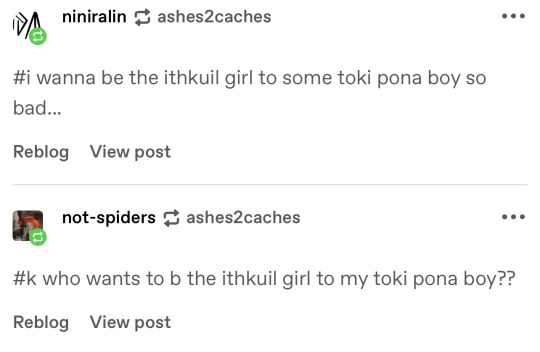
I’d watch this rom com
#196#rule#196 campfire#r196#queer#trans#meet cute#mutual pining#ao3#ithkuil#toki pona#conlang#conlangs#constructed language#linguistics#languages
498 notes
·
View notes
Text
conlanging be like: you have 7 words for child/offspring, but you don’t have a single word for bread
243 notes
·
View notes
Text
Thoughts and observations on universal calligraphy applied on neography.
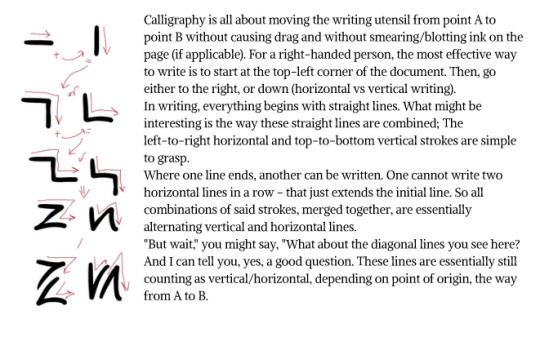

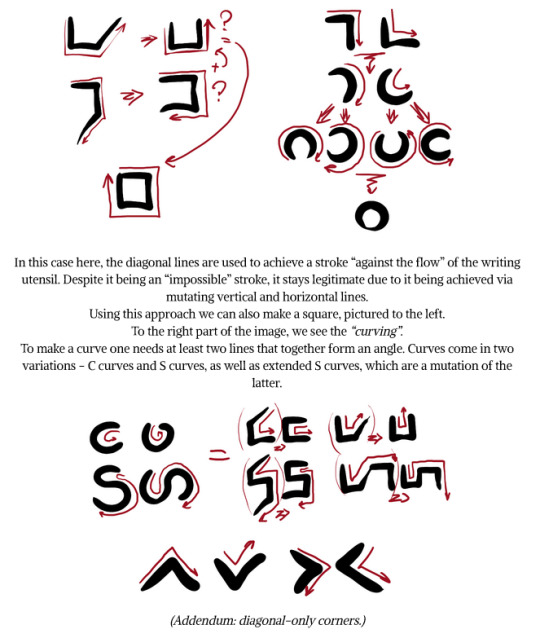


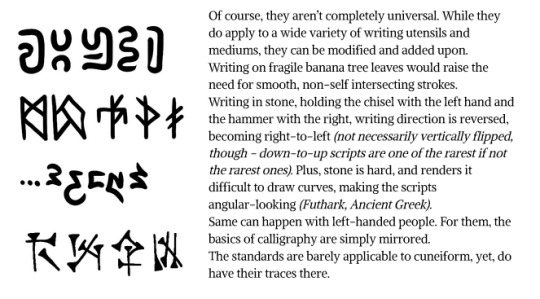
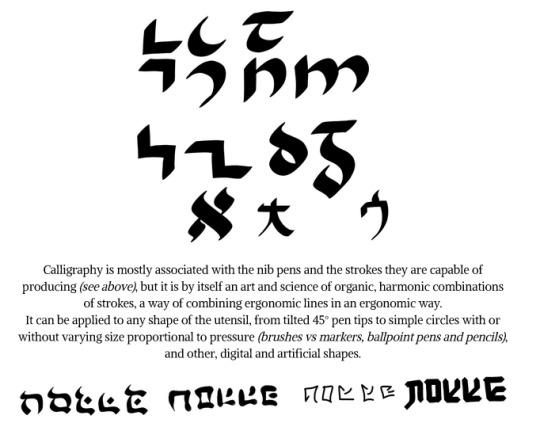

#conlangcrab#conlanging#conlang#constructed language#conlangcrab talks#linguistics#neography#calligraphy tutorial#calligraphy#conscript#art ref#art tutorial#thecrazyneographist
184 notes
·
View notes
Text
Clanmew 101
A Warrior Cats Conlang

[ID: Two Warrior Cats OCs speak to each other. On the left is a calico with green eyes named Troutfur. On the right is a leucistic tabby with pink eyes named Bonefall.]
Urrmeer, Clanmates! And welcome to Clanmew 101!
By the end of this lesson you should have a basic understanding of the most important aspects of Clanmew, the language of the five Clans of cats living around Sanctuary Lake.
You will learn to introduce yourself, choose the appropriate pronoun for a situation, construct simple sentences, describe attributes and understand opening particles, express possession, ask simple questions, and use the Clans’ counting system. This should cover all the basics needed in order to have a simple Clanmew conversation.
Lastly, we'll close out with a vocabulary list, and some translation excercises you can do on your own!
This guide is a massive collaboration, written largely by @troutfur with all vocabulary made by @bonefall. This guide is also available in Google Doc format, and there is a lexicon of over 300 words in this Google Sheet.
We've been working on this for several weeks, and we're beyond excited to bring it to you today!
About Clanmew
Clanmew is a language that emphasizes ranks and relationships first and foremost. The rigid nature of Clan culture is baked into the very structure of their sentences, immediately making it clear what your relationship to a thing is, and where you’ve received information about a subject.
Unlike English, in Clanmew, every line is packed with information about a warrior’s relationships and feelings towards the cats around them, turning even quick exchanges into reaffirmations of where a warrior stands in Clan society.
- Introduce yourself; the lack of a personal pronoun
Two cleric apprentices are meeting each other at a half-moon meeting for the first time. Here’s how they would introduce themselves to each other:
Babenpwyr: Pyrrsmeer! Babenpwyr. Washa-ulnyams shompiagorrl. Pryyp pyrrs?
[Noncombatant-you-hello! Bonepaw. Shadow-clan moon-learning-rank. Question noncombatant-you?]
Powshpwyr: Powshpwyr. Ssbass-ulnyams shompiagorrl.
[Troutpaw. River-clan moon-learning-rank]
Translated to English we have:
Bonepaw: Hello! My name is Bonepaw! I’m a ShadowClan cleric apprentice. And you?
Troutpaw: My name’s Troutpaw. I’m a RiverClan cleric apprentice.
This is a very typical introduction in the Clans. Right away these two cats establish their relationship to each other, which Clan they’re from, and their rank within it.
If you examine the way Bonepaw and Troutpaw tell each other their names, it is immediately notable how they only say them. In Clanmew there is no "first person" pronoun, no word that means "I" or "me", and similarly there is no word for the verb "to be". It is understood that if you say a word by itself, those two parts are implied. Thus Babenpwyr is both Bonepaw’s name and a full sentence that means “I am Bonepaw”.
Similarly when Bonepaw says "Pryyp pyrrs?" There is no word for "are" or "is". "Pryyp" establishes the sentence as a question, and "pyrrs" simply means "you".
There are other nuances to the grammar to explore but first, let's skip forward a few seasons, after Troutpaw and Bonepaw change paths and meet once again under the light of the full moon.
Powshfaf: Babenpwyr, pyrrsmeer!
[Bonepaw, noncombatant-you-hello!]
Babenfew: Nyar, rarrwang gryyr! Babenfew!
[No, outsiderness I-contain! Bonefall!]
Powshfaf: Pryyp kachgorrl rarrs? Ssoen wowa rarrs shai ssarshemi!
[Question, claw-rank outsider-you? On/over outsider-you stars they-shine!]
Translated we have:
Troutfur: Hi, Bonepaw!
Bonefall: No, use the rarrs pronoun with me. It's Bonefall.
Troutfur: Oh, you're a warrior? Congrats!
This too is a common interaction among Clan cats. No warrior ever misses a chance to boast about a newly granted name, especially to a friend who already has their own. Here we see another important feature of Clanmew grammar, the choice of pronoun. Clanmew pronouns have nothing to do with gender, but rather, how dangerous the subject is to you.
This is called…
- Threat Level
How To Choose the Appropriate Pronoun
Using the pyrrs pronoun may be appropriate with a cleric, or an apprentice, or a close friend in your same Clan. But for an enemy warrior it’s inappropriate, or even rude, regardless of if they’re a friend or not. It may indicate you are underestimating them, or worse, that you two are traitorously close to each other.
Each pronoun in Clanmew has a third person ("he", "she", "they") form and a second person (“you”) form. The full list of pronouns and when to use them is given below, from least to most threatening.
(Them/You)
Wi/Wees
The softest, weakest possible way to refer to a person. It is used exclusively for babies, aesthetically pleasing but useless objects, and food. “Mousebrain” is either Wiwoo (them-mouse) or Weeswoo (you-mouse).
Nya/Nyams
This one indicates familiarity and closeness, moreso than with a Clanmate or a trusted ally. It is used for mates, platonic life partners, siblings, and so on. It’s sometimes used on objects that significantly change a cat’s life, such as Briarlight’s mobility device.
Pyrr/Pyrrs
Used for apprentices, medicine cats, elders, exhausted warriors, and other non-combatants, but also for friends. It’s a neutral-weak pronoun. Used incorrectly, it can be patronizing, or over-familiar. This is also used on useful objects, like nests, herbs, Jayfeather’s stick, etc.
Urr/Urrs
Indicates a capable clanmate, carries an implication that they are able to hunt or fight at the described moment. The term carries endearment– the old RiverClan river was referred to with Urrs, for respect. Strong, worthy prey is in this category; RiverClan refers to medium-sized fish with urrs, WindClan uses it for hares, etc.
Rarr/Rarrs
Now we’re in the 'outsider’ category. These are not used on clanmates without insult. Used for things that require extra caution. A lot of twoleg things like fences and bridges are 'rarr’. The cats who live in the barn and other loners are 'rarr’. Warriors in other clans are 'rarr.’
Mwrr/Mwrrs
Something dishonorable, that lives without code. Rogues are tossed into this category before proven otherwise, as are snakes, foxes, badgers, and dogs. This is a serious insult when used for a Clan cat.
Ssar/Ssas
Something powerful and dangerous. Storms, floods, cars. Overwhelming and unpredictable, in a way where its power cannot be contained– can be a high compliment to the respected warriors of other clans, implies the same sort of respect you would give to a natural disaster. Commonly used on leaders of other Clans.
- Objects, Subjects, and Verbs
Constructing a Simple Sentence
In English most sentences have three parts, someone who does an action (a subject), an action that is done (a verb), and something the action is done to (an object). By default English sentences order these three elements in the order, Subject-Verb-Object. But Clanmew orders them differently; Object-Subject-Verb.
Compare these sentences;
“The warriors hunt mice.”
[Simple English statement]
“Mice the warriors hunt.”
[Grammatical equivalent in Clanmew]
Translating this into Clanmew looks like this,
Pi woo kachgorrl urrakach.
[Saw/heard mouse claw-rank clanmate-they-hunt.]
Saw mouse warrior they-hunt.
[Direct translation]
Let’s ignore that first word for now and just focus on the subject, object, and verb.
“Woo” in this context means “mouse” or “mice”. Clanmew makes no grammatical distinction between singular and plural, whether there is only one of the noun or more than one. Likewise, “kachgorrl” means “warrior” without specifying how many or which warrior(s) specifically. Finally “urrakach” is composed of a prefix “urr-”, the pronoun for a clanmate, and “akach” the present form of the verb that means “to hunt”.
A specific named subject can be omitted but a pronoun prefix can never be omitted in a Clanmew sentence. Even the absence of a prefix is considered a prefix itself, meaning “I” or “me”. Thus the speaker’s relationship towards the subject is always specified.
- Describing Attributes
When Bonefall corrected Troutfur's pronoun usage earlier he was using this Object/Subject/Verb (OSV) sentence structure; "Rarrwang gryyr" means "Use the rarrs pronoun with me," but is constructed as "Outsiderness (I)-contain". “Rarrwang” itself is constructed of the pronoun “rarr” and the suffix “wang” which indicates a noun embodying a certain quality.
This sentence construction with the verb “gryyr” and a noun with the “wang” suffix can also be used to describe someone or something with any other attribute. Let’s see the following examples:
Yaowang gryyr.
[Female-quality I-contain.]
"I’m a molly."
The word “yaow” is part of a set with “ssuf” (“male”), and “meewa” (“genderless”).
Pi morrwowang urrgryyr.
[Seen/heard fast-quality they-clanmate-contain.]
"She’s big."
"Morrwo" is part of a set with "Eeb" (small) and "Nyarra" (average).
Urr’rr boe gabpwang mwrrgryyr.
[Whisker-felt strength-quality they-rogue-contain.]
"She’s very strong."
Now, let’s see how you can describe someone with more than one attribute!
Bab boe gabpwang om boe morrwowang rarrgryrr.
[Heard-say very strong-quality and very big-quality outsider-they-contain.]
"She is very strong and very big."
Bab boe gabp-om-morrwowang rarrgryrr.
[Heard-say very strong-and-big-quality outsider-they-contain.]
"She is very strong and very big."
These two sentences may look completely equivalent, but the constructions used here actually convey two different shades of meaning.
In the first sentence, the qualities of strength and bigness are understood to not be related to each other. The size is unrelated to her strength. Perhaps she’s big as in fluffy rather than physically imposing! The second construction indicates very much the opposite, that the bigness and strength are related attributes.
Now you may notice by this point that there’s a little word at the beginning of most sentences. It is called an…
- Opening Particle
Opening particles are used to indicate many things such as where the information conveyed is coming from, that the sentence is a question or command, or even that the sentence is a hypothetical being posited.
In statements that denote facts, there are 5 such particles, indicating the way by which this knowledge was acquired. They are:
Bab
Used for information the speaker does not have first-hand knowledge of. Anything that someone has heard from someone else such as news, gossip, or a report falls into this category. Information in this category is considered the least reliable of all categories.
Yass
Used for information acquired through the smell, taste, or the use of Jacobson’s organ. Metaphorically, it has also been extended to things one believes or thinks, and logical deductions. In its metaphorical capacity it is considered second least reliable.
Urr’rr
Used for information acquired through one’s whiskers. Metaphorically, it also extends to emotions, intuition, and other such feelings. Considered the second most reliable source of information when used as such.
Pi
Used for information one has seen or heard directly. Considered the most reliable form of information in most situations. When it comes to information acquired through multiple sources, if visual or auditory sensations are included “pi” will almost always be preferred.
Ssoen
Used by StarClan it indicates information they have access to by virtue of their alleged omniscience. Used by a regular Clan cat it is used to quote the words of a prophecy or to give one’s words the same weight as StarClan’s. In this second usage, it is most often used to give blessings, such as the phrase Troutfur used to congratulate Bonefall.
The lack of a particle can in a way be thought of as a particle in itself too! This indicates that some piece of information is self-evident to the speaker. Examples of when it is appropriate to omit sentence-starting particles have been explored before: introducing oneself, correcting pronoun usage, stating one’s gender, all concerning the self.
Let’s see some examples in practice!
Bab mwrrworrwang Raorgabrrl mwrrgryyr.
[Heard-say murder-quality Lionblaze he-rogue-contains.]
"I’ve heard that Lionblaze is a murderous rogue."
Yass woo nyyrwang mwrrgryyr.
[Smelled/tasted mouse rotten-quality they-rogue-contain.]
"I have smelled/tasted that the mouse is rotting."
Urr’rr rrarpabrpabrpabr.
[Whisker-felt he-outsider-pummeled.]
"He pummeled (me), I felt with my whiskers."
Pi powsh pabparra Ssbass-ulnyams rarrakachka.
[Saw/heard trout patrol-amount RiverClan they-outsider-hunted.]
"I saw a RiverClan patrol catching trout."
Ssoen ulnyams kafyar-ul ssarshefpa.
[Prophetic clan wild-fire-only they-natural-force-will-rescue.]
"Fire alone will save the Clans."
There are 3 other important particles to introduce; Karrl, Hassayyr, and Pryyp
“Karrl” indicates that a statement is a command.
Bonfaf, karrl piagorrl urrsshaiwo.
[Stonefur, command learning-rank you-clanmate-star-will-kill.]
"Stonefur, execute the apprentices."
“Hassayyr” indicates that a statement is a “what if”.
Hassayyr om pyrrs papp.
[What-if with you-noncombatant (I-)will-walk.]
"What if we went for a walk?"
“Pryyp” indicates that a statement is a question.
Pryyp mew wissuff?
[Question kitten they-harmless-suckle?]
"Are the kittens suckling?"
We will talk more about “pryyp” and asking questions a bit later, but first we’ve got to discuss…
- Possession
The simplest and easiest way to say that a person is in possession of something is to use their name as a pronoun like so;
Pi woomoerr'pbum Yywayashaiwrah
[Seen/heard food-hole-bread Harestar-owns.]
"I see the tunnelbun that Harestar owns."
This is only possible for simple statements, and is possible because 'wrah' is a rare, irregular single-stem verb. But more of that will come in another lesson!
There are more common ways to phrase possession. Compare the following two sentences:
Pi woomoerr’pbum Yywayashai urrwrah.
[Seen/heard food-hole-bread Harestar he-owns.]
"I see that my clanmate Harestar has a tunnelbun."
Pi Yywayashai urrwrah woomoerr’pbm Hrra’aborrl urrnomna.
[Seen/heard Harestar he-owns food-hole-bread Breezepelt he-eats.]
"I see that my clanmate Breezepelt is eating my Clanmate Harestar’s tunnelbun."
In the second sentence, the phrase “Harestar’s tunnelbun” is constructed with the same words of the sentence “Harestar has a tunnelbun”, however, the opening particle is dropped and not repeated. The difference is that the object (“woomoerr’pbum”) has been moved to the end.
Thus the phrase “Yywayashai urrwrah” (“Harestar he-owns”) can be understood in this situation to be an adjective that modifies “tunnelbun” in the second sentence. This construction is not limited only to statements about possession, but this is the most common case in which it is used.
You can make possession even clearer with the connecting particle, "en." For example,
Pi Yywayashai-en-woomoerr’pbum Hrra’aborrl urrnomna.
[Seen/heard Harestar-’s-tunnelbun Breezepelt he-eats.]
"I see that my clanmate Breezepelt is eating the tunnelbun-of-Harestar."
All of these phrasings are perfectly grammatical. The use of a shorter, more explicit construction is a function of style and clarity. It is similar to how the idea could in English be expressed equally with the phrasings “Harestar’s tunnelbun”or “the tunnelbun of Harestar”.
Next, we will learn to ask simple questions.
- Simple Questions
“Pryyp” is a very useful particle! In front of a simple statement, it makes it into a yes-no question. For example:
Pryyp Yywayashai woomoerr’pbum urrwrah?
[Question Harestar food-hole-bread he-has?]
"Does Harestar have a Tunnelbun?"
To answer you have a couple options. You could restate the verb along with an opening particle to specify how you know:
Pi urrwrah.
[Seen/heard he-has.]
"He does, I’ve seen."
But what if he doesn't have one? You can negate the verb with the prefix “nyar”! Make sure to place in front of the verb but after the pronoun:
Pi urrnyarwrah.
[Seen/heard he-not-have.]
"He does not, I’ve seen."
Or you could respond with your opening particle, and a simple yes or no:
Pi mwyr/nyar.
[Seen/heard yes/no.]
"Yes/no, I saw."
But it isn’t the only type of question you can ask with Clanmew. In conjunction with a question word in the appropriate place, you can ask more open ended questions. Let’s see an example conversation from WindClan camp:
Hrra’aborrl: Pryyp woomoerr’pbum yar urrwrah?
[Breezepelt: Question food-hole-rabbit who they-have?]
Yywayashai: Pi Ipipfbafba pyrrswrah.
[Harestar: Seen/heard Kestrelflight he-has.]
In English,
Breezepelt: "Who has the tunnelbun?"
Harestar: "I saw Kestrelflight has it."
In this construction we see some interesting aspects of the grammar. The pronoun “yar” (“who”) replaces the subject in the first sentence, but the verb is still conjugated with “urr”.
This shows that Breezepelt assumes that the answer to his question is going to be a battle-capable clanmate. When Harestar answers though, he uses the “pyrrs” pronoun, as is appropriate when talking about a cleric such as Kestrelflight. Because of how the grammar works, Breezepelt is forced to make an assumption as to what his answer would be and Harestar automatically corrects it.
Harestar could have also answered:
Yywayashai: Pi pyrrswrah.
[Harestar: Seen/heard he-has.]
Which is roughly translated to:
Harestar: "He has it."
With this answer Harestar is assuming Breezepelt will be able to figure out which noncombatant has it... but remember; clerics, apprentices, elders, and even close friends of the speaker are all encompassed by “pyrrs”. It may not be as clear as Harestar thinks it is!
To ask a multiple-choice question using “pryyp”, you could do it like this:
Wishwash: Pryyp woomoerr’pbum wragyr nyom Yywayashai nyom Ipipfbafba mwrrwrah?
[Heathertail: Question food-hole-bread boar or Harestar or Kestrelflight they-rogue-have?]
Hrra’aborrl: Pi (wragyr) mwrrwrah
[Breezepelt: Seen/heard (boar) they-rogue-has.]
Which would translate to:
Heathertail: Who has the tunnelbun, a boar, Harestar, or Kestrelflight?
Breezepelt: "I saw the boar has it."
Without “pryyp”, Heathertail’s question would be understood as a statement. “Either the boar, Harestar, or Kestrelflight has the tunnelbun.” But by starting the sentence with the appropriate particle she was able to convey it was a multiple choice question.
Breezepelt can also choose if he wants to specify "boar," or simply use the rogue pronoun in this situation. Harestar and Kestrelflight are not enemies, and so simply saying "Pi mwrrwrah" would make it clear that the boar has it.
This sentence also brings up the question of pronoun agreement when there’s more than one subject. Remember this; the pronoun of the most dangerous subject always has priority.
We've come a long way and learned a lot! Next, we'll cover the complicated way that Clan cats count and measure.
- Counting
We arrive in WindClan near the end of a harrowing scene. Cloudrunner's mate Larksplash has died in childbirth, and he has been told that because of complications, the litter has a sole survivor.
Hainyoopa: Ul-arra nyams wi? Ul-arra mew-ul wi? Ul-arra arkoor shai ssarakichkar om Ul-arramew ssaryorru!
[Cloudrunner: Whole-amount kin baby-they? Whole-amount kitten only baby-they? Whole-amount existence stars natural-force-they-grab and whole-fraction-kitten natural-force-they-left!]
Cloudrunner: "He’s my whole kin? He, who is only a single kitten? StarClan took everything and left me Onekit!"
With these dramatic words, Cloudrunner declared his son's name; Onekit.
The nuances of this expression of grief are hard to grasp unless one has an understanding of the counting system of the Clans. Clanmew does not count with straightforward numbers; instead, they have fractions associated with a given concept.
Arra = Between 1 and 4 = Amount of pieces of prey that can fit in a mouth.
Used for small quantities of concrete things. This fraction is the closest Clanmew gets to simple counting.
Rarra = 5 = Amount of claws on one paw, amount of Clans.
Used to count body parts or the amount of warriors in a usual patrol.
Pabparra = 9 = Amount of a full day's patrol assignments.
Used to count groups of cats, enough to patrol a territory or run a Clan.
Husskarra = 12 = Amount of whiskers on one side of the face.
Used to count a day’s work, things that are being sensed in large amounts.
Shomarra = Around 30 = Amount of days in a lunar cycle.
Used to count amounts of time longer than a day.
These five “fraction words” are almost always preceded by an adverb specifying how much of that amount. The adverbs paired with the amount words are:
Prra = Beginning, usually one but can be any amount under a ��warl”
Warl = Quarter
Yosh = Half
Ark = Three-quarters
Ul = Entire
When they are not preceded by a prefix, they aren’t meant to be taken as an exact number, but as an estimation. Clanmew does not value exactness.
Finally there are two useful phrases that can modify these numbers:
Om owar = And another
Nyo owar = Less another
The choice of number word is based on what is being counted, not what is mathematically most convenient. “Om owar” and “nyo owar” thus are very useful phrases to express quantities over what the usual number for the appropriate counting word is. More rarely they are used to express the concept of “+1” and “-1”. This usage is rare because Clan cats don’t really care that much about precision, especially for amounts over four.
Let’s see some examples:
Ul-pabparra om owar ul-pabparra arrlur.
[Whole-patrol-amount and whole patrol I-compelled.]
"I sent out two patrol’s worth of cats."
Karrl arlkatch praa-shomarra om owar om owar om owar.
[Command will-fight beginning-moon-amount and another and another and another.]
"We will fight 3 days from now."
Shomarra nyo owar ssar.
[Moon-amount less another they-natural-force.]
"The month is a day shorter."
And now let’s see an example of numbers in a brief conversation:
Bayabkach: Pi pishkaf pabparra Hwoo-ulnyams rarrkachka.
[Brambleclaw: Seen/heard red-squirrel patrol-amount Wind-Clan they-outsider-hunted.]
Fofnanfaf: Pryyp arra rarr?
[Brackenfur: Question amount they-outsider?]
Bayabkach: Pi rarra, yosh piagorrl om yosh kachgorrl, rarr.
[Brambleclaw: Seen/heard outsider-amount, half learning-rank and half claw-rank they-outsider.]
Brambleclaw: "I saw a WindClan patrol hunting squirrels."
Brackenfur: "How many?"
Brambleclaw: "An outsider-amount, a quarter apprentices and a quarter warriors."
In this exchange when Brambleclaw says “an outsider-amount” he means a standard 5-member patrol. When he further specifies half warriors and half apprentices he specifies about 2 or 3 are warriors and another 2 or 3 are apprentices.
Here’s another conversation that happened in the middle of a ShadowClan patrol:
Rarrlurfaf: Pryyp woo urrpi?
[Russetfur: Question food you-clanmate-perceive]
Uboshai: Mwyr, pi ark-arra amam pipa.
[Blackstar: Yes, perceive three-quarters-amount toad hear.]
Russetfur: "Do you sense/see/perceive any prey?"
Blackstar: "Yes, I hear three toads."
In this sentence “ark-arra” implies three toads but there may be more. If Blackstar wanted to specify there’s three and only three toads, he could have said “ark-arra ul” (three-quarter-amount only).
There are also numerous very useful idiomatic expressions using the number systems! Let’s look at a few of them.
Gryyr ul-arra arrl!
[I-contain whole-amount I-must!]
"I must do everything myself!"
Gryyr huskarra om owar huskarra arrl!
[I-contain whisker-amount and another whisker-amount I-must!]
"This is all overwhelming!"
Finally, let’s examine briefly why Cloudrunner’s lament about his kit was so despairing.
As you can see from above “ul-arra” would mean “whole amount”. That may not sound particularly emotional but for a Clan cat, for whom life is fundamentally communal, the implication of the whole amount of the smallest possible fraction brings to mind the idea of loneliness.
The names Onekit, Onewhisker, and Onestar (“Ul-arramew”, “Ul-arrahussk”, and “Ul-arrashai”) could very well have been translated as Lonekit, Lonewhisker, and Lonestar.
- Vocabulary:
Down below you will find a vocabulary list used in this lesson.
Particles, threat level pronouns, and number words have been omitted as they are explained at length in the text above.
Some verbs used in tenses other than the present are only given in the present tense. Correct use of the past, present, and future and of different verb forms will be explored in a future lesson.
[If you're craving even more vocabulary, check out the Lexicon]
Common Nouns:
Arrkoor: The universe, existence
Baben: Bone
Bayab: Bramble; blackberry plant (Rubus fruticosus)
Bon: Stone
Borrl: Pelt, skin and the fur on it
Faf: Fur
Fofnan: Bracken
Hrra'a: Breeze
Hussk: Whisker
Ipa: Ear
Ipip: Kestrel (Falco tinnunculus)
Ipo: Eye
Kach: Claw
Kafyar: Wildfire
Mew: Kitten
Nyams: Kin
Pabparra: Patrol
Pishkaf: Red squirrel (Sciurus vulgaris)
Powsh: Common brown trout (Salmo trutta)
Pwyr: Toebean; The -paw suffix, used to indicate the rank of apprentice
Raor: Lion
Shai: Star
Skurss: Tyrant; the name of the ThunderClan warrior Iceheart when he was leader of BloodClan
Swash: Tail
Wask: Holly
Wish: Bell heather (Erica cinerea)
Woo: Mouse; Food
Woomoerr'pbum: Tunnelbun
Wragyr: Boar (sus scrofa)
Yywaya: Brown hare (Lepus europaeus)
The Clans:
Ulnyams: Clan
Hwoo-ulnyams: WindClan
Krraka-ulnyams: ThunderClan
Sbass-ulnyams: RiverClan
Washa-ulnyams: ShadowClan
Yaawrl-ulnyams: SkyClan
Ranks:
Gorrl: Rank
Shaigorrl: Leader
Arrlgorrl: Deputy
Shomgorrl: Cleric
Kachgorrl: Warrior
Piagorrl: Apprentice
Shompiagorrl: Cleric apprentice
Pronouns:
Owar: Another
Yar: Who
Verbs:
NOTE: All verbs given are present tense.
Akach: Hunts
Akichka: Grapples, grabs
Arrl: Compels, orders; Must
Arrlkatchya: Fights
Babun: Beats (of a heart); In names sometimes translated as the -heart suffix such as Kafyarbabun (Fireheart)
Few: Falls
Fbafba: Flies, is flying (of a bird or winged animal)
Gabrrl: Crackles (of fire)
Gryyr: Contains
Nomna: Eats
Nyoopab: Gallops, running fast
Pabrpabr: Pummels
Pappa: Walks
Pi: To see or hear, to perceive generally
Pipa: To hear
Pipo: To see
Shefpash: Rescues
Shemi: Shines
Sskif: Wants
Ssuff: Suckles
Worr: Kills
Mwrrworr: Kills dishonorably, commits murder
Shaiworr: Executes, kills in StarClan's name
Wrah: Owns
Yorr: To leave behind
Suffixes:
-ul: Only, by itself
-wang: -ness, the quality of being like a thing.
Adjectives:
Eeb: Small
Gabp: Strong
Meewa: De-sexed, genderless
Morrwo: Fast
Nyarra: Of average size
Nyyr: Rotting; Bad
Osk: White
Rarrlur: Russet
Shem: Shining; Good
Ssuf: Male
Ubo: Black
Yaow: Female
Adverbs:
Boe: Very
Mwyr: Yes
Nyar: No
Conjunctions:
Nyo: Less, minus
Nyom: Or
Om: And, plus
Expressions:
-meer: Hello! (Always used with a pronoun prefix)
Ssoen wowa [2nd person pronoun] shai ssarshemi!: Congratulations!
Gryyr ul-arra arrl!: I must do everything myself!
Gryyr huskarra om owar huskarra arrl!: This is all overwhelming!
Try it yourself!
Below are ten open-ended exercises so you can practice and test your knowledge. Feel free to reference the vocabulary list and the main text of the lesson as much as you need. For an extra challenge you can try responding without looking at them or making new sentences of your own!
You’ve just been accepted into a Clan, and even though your leader hasn’t granted you a warrior name yet, they trust you enough to take you to a gathering. How would you introduce yourself to the Cats of the other Clans?
During a patrol you encounter the treacherous and murderous exile Liontail. He tries to appeal to your friendship, but you’re a loyal cat of your Clan so of course you won’t hear this rogue out! Correct his pronoun usage so he knows you’re a threat to him.
You approach the fresh kill pile and smell a rotting squirrel carcass. How would you warn your clanmates?
You are an apprentice and your mentor tells you to check for scents. You can make out 3 unique smells; two strange cats, and a toad. How do you report this to your mentor?
Your clanmate has trouble telling Snowpelt and Whitefur apart. They’re both blue-eyed white cats but while Snowpelt is large and a molly, Whitefur is small and a tom. How would you tell your clanmate this?
Your friend is describing the feared BloodClan leader Scourge, and says they are both small and strong. You want to interject and point out that Scourge was strong because he was small, and often underestimated. How do you phrase this?
While hunting, a rogue attacks your patrol! After the scuffle is over, you notice that the mice you were carrying are gone! Ask your clanmates who has the mice; them, or the rogue.
A RiverClan cat offers you some of the food they brought for the gathering. You know they brought both mice and trouts and you want to make sure you don’t eat any of those smelly fish they are so fond of. Ask them whether they have a mouse or a trout.
You are a RiverClan warrior who just offered a cat from another Clan some of the food you brought to the gathering. The cat in question just asked whether you have a mouse or a trout. It seems kind of obvious to you but it’s only polite to reply. Tell them that you’ve got a trout.
You are the deputy, and you are assigning patrols. At the end, you have 3 cats left over (Kestrelclaw, Hollyheart, and Snowear), and you must ask your leader which of these cats they would like to patrol with.
Once you'd tried them out on your own, you can check your answers over here!
#Clanmew#Conlang#constructed language#grammar#Clan Culture#Warrior Cats#Better Bones AU#Exercises#language#wc#Funfact OSV is the rarest grammatical format#And it's the format Yoda uses when he speaks#We didn't realize it at the time we picked it. It just felt right to emphasise the action last#Linguistics
680 notes
·
View notes
Text
my conlang kinda started off as a joke of “how long can i make words and how many consonants can i shove in there together,” and i’m doing really good so far because my word for “word” is “tanam’amdžle” and it comes from “tana`” meaning letter, “a’mdžle” meaning collection, and “m” meaning and, a word that also doubles as a way to connect two words into a compound word, making my word for “word” literally mean letter collection.
in case you’re wondering, in my conlang, “džl” makes the j sound. i just wanted to be evil for a second
88 notes
·
View notes
Text
Your Conlang Year

Jessie Peterson (@quothalinguist) has a brand new project, and it’s a project for all conlangers, both veterans and newcomers! It is called the Conlang Year project, and what it is is a microprompt every single day for an entire year to help you build a new conlang starting from absolute scratch.
Building a new language is a daunting process, but ever since she started teaching her very first class, Jessie has been working hard to demystify the conlanging process for those who are interested but don’t know where to start. This is the culmination of that process!
So, if you’ve ever been curious about creating your own language, there’s never been a better time to start! Today is January 1st, 2024. What will you do with your conlang year?
Follow along at quothalinguist.com!
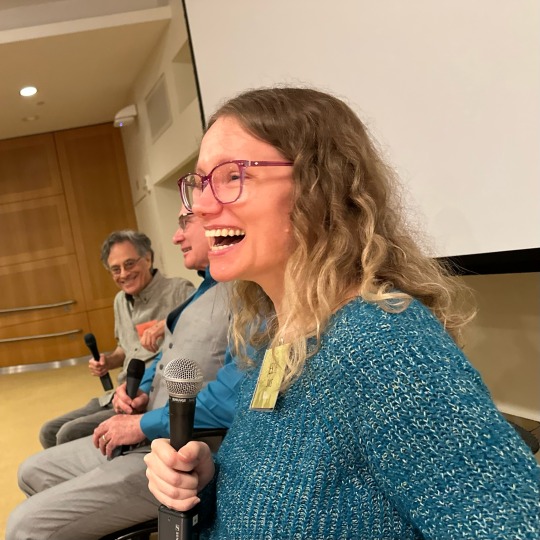
#conlang#language#language creation#conlang year#conlangyear#language invention#constructed language#Jessie Peterson
98 notes
·
View notes
Text
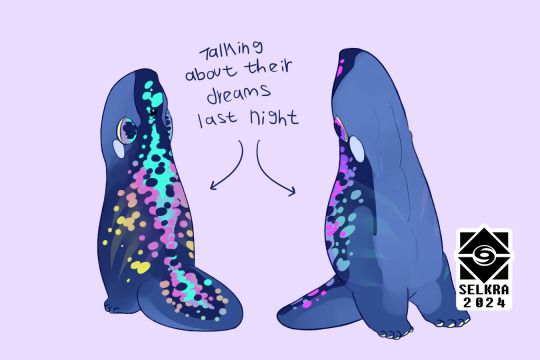
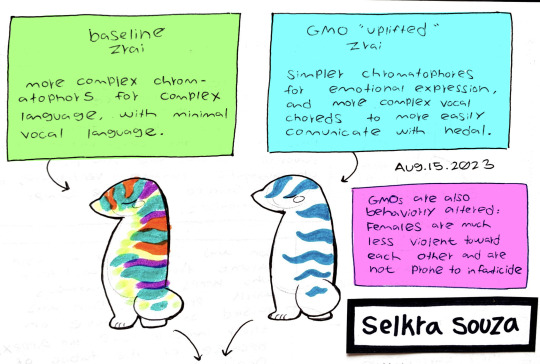
There's two variants of zrai recognized by most intragalactic communities. The zrai from this post are a genetically modified variant engineered by nedal as part of the zrai's 'uplifting' and integration into nedal societies (and the larger space community). The main change made was simplifing the chromatophores used to express emotion, and engineering more intricate vocal chords for speech capabilities to match the nedal, all to make communication between the two species easier. GMO zrai also have some modified behaviors, for example, the traditionally territorial females have been mellowed to better corporate with others outside their tribe (to better fit into wider society).
The zrai on the left image are the 'baseline' 'default' morph shared by their ancestors. Zrai traditionally have complex dialogue using more complex chromatophores, as opposed to vocal speech.
Putting a GMO and a baseline in the same room creates a language barrier between the two, since the former relies on vocalizing, and the later relies on color display. To a GMO, the baseline is communicating in an overly ornate and barely recognizable medieval language; while to a baseline, a GMO is speaking in incomprehensibly fragmented LEETspeak.
While GMO zrai are better integrated into nedal society (and as a result other alien societies), the nerf to their traditional communication methods ostracizes them from their heritage and their neighboring baseline zrai. Because baseline zrai are highly tribalistic, most traditional communities are actively hostile to GMO zrai, treating them as a separate species. This is extra belittling to more friendly GMO zrai who seek to form community with them. Baseline zrai mostly live on their homeworld (though some closely knit tribes have formed settlements elsewhere with help of space faring sophants) . Meanwhile GMO zrai are living all across the galaxy, and they live across a wide variety of societies, so whether or not being cutoff from their lineages is a distressing issue will vary across individuals and local populations.
#selkra scribbles#my art#brokenyolkgalaxy#broken yolk galaxy#zrai#alien#speculative biology#worldbuilding#xenofiction#speculative zoology#astrobiology#conlang#constructed language
68 notes
·
View notes
Text

#linguistics#linguistic#languages#shitpost#lingblr#linguist shitpost#conlang#conlanging#constructed language#conlangs
138 notes
·
View notes
Text
So a fun fact about me is that I ADORE worldbuilding, both learning about other constructed worlds and developing a constructed world of my own. So I was thinking that I might do a little series on worldbuilding, where I talk about concepts and successes in worldbuilding with examples from the Grishaverse (and maybe from my world too…?). Let me know if you guys would be interested in that :)
#worldbuilding#fantasy books#grishaverse#leigh bardugo#six of crows#crooked kingdom#fantasy world#fantasy language#writing#writing fantasy#fantasy writer#world building#world#constructed language
212 notes
·
View notes
Text
Reachtongue Update 24/02/05
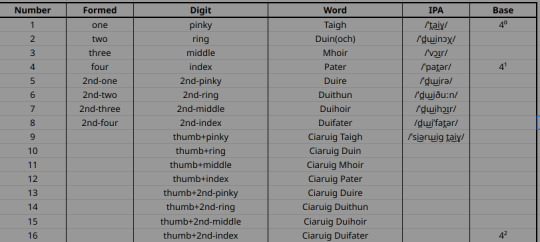
number system (wip)
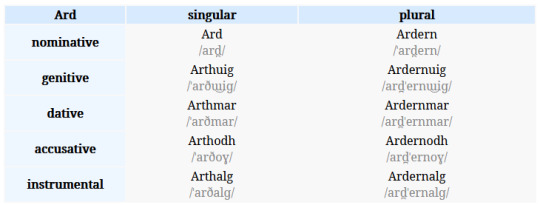
declension example. inspired by uralic, and used a lot of Diachronica
wanted to post more, but pc keeps dying randomly, so this is what's on my phone rn. I'll post more later, it's 4:18 lol
57 notes
·
View notes
Text

Arhak astaškiik angkitš'ooqilaap at'giiš.
If you give a man a fish he eats today.
Tiistiluutimatiirivailaap uitani giitsili.
If you teach a man to fish he eats forever.
Ayaak ana šagaleqoq.
But you have done neither.
Agitšinngaanip a'tiigiintu airi a'ntahanngaanip šuuri,
ilaruuts'oq nutl'aat'ooq ngantaharaq nngut'agari.
You have stood before us eating fish after fish and chided us for being wasteful.
Aranngaanip tuuassik yuunnitu a'iimbambairuningaangaa
yahaš ngagati' tiiuyii.
You told us that you own the river and our parents should have
gotten us the same if we wanted fish.
Arhak astaškiik angkitš'ooqavaap ngantaambaitsag
tuuassisii ningii turaš ana arii aap'aap'aš turaš.
You gave a man a fish to murder us if we are too close to the river
or if we speak too loudly.
Astaškilug isawihipannapi ruts'ag.
We must trade fish to you in order to leave.
#conlang#constructed language#translation#conscript#constructed script#artlang#arhanngi#anni#conlanging#my art#translated from a text post by @elymaiis on Tumblr
130 notes
·
View notes
Text

Working on the modern version of my new language's script, pretty content with this but may change some things.
111 notes
·
View notes
Text
Me when creating a conlang: I love you sandhi, I love you vowel harmony, I love you consonant synharmony, I love you aspirated stops, I love you uvular consonants, I love you ejectives, I love you large consonant clusters, I love you open syllable structure, I love you strict consonants cluster parameters, I love you three vowel system, I love you lateral fricative, I love you syllabic consonants, I love you epenthetic vowels, I love you....
#conlang#constructed language#conlanging#phonology#worldbuilding#languages#linguistics#They are all my faves#Creating a mixed language so I can have 2 phonologies in one mwaahahahahahahahaha
76 notes
·
View notes